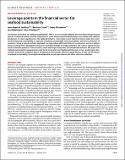Leverage points in the financial sector for seafood sustainability
Abstract
Can finance contribute to seafood sustainability? This is an increasingly relevant question given the projected growth of seafood markets and the magnitude of social and environmental challenges associated with seafood production. As more capital enters the seafood industry, it becomes crucial that investments steer the sector toward improved sustainability, as opposed to fueling unsustainable working conditions and overexploitation of resources. Using a mixed-methods approach, we map where different financial mechanisms are most salient along a seafood firm’s development trajectory and identify three leverage points that can redirect capital toward more sustainable practices: loan covenants, stock exchange listing rules, and shareholder activism. We argue that seafood sustainability requirements need to be integrated into traditional financial services and propose key research avenues for academic, policy, and practice communities. While our study focuses on the role of finance in seafood sustainability, the insights developed are also of high relevance to other extractive industries.
Citation
Jouffray , J B , Crona , B , Wassénius , E , Bebbington , J & Scholtens , B 2019 , ' Leverage points in the financial sector for seafood sustainability ' , Science Advances , vol. 5 , no. 10 , eaax3324 , pp. 1-11 . https://doi.org/10.1126/sciadv.aax3324
Publication
Science Advances
Status
Peer reviewed
ISSN
2375-2548Type
Journal article
Description
Funding: The authors acknowledge support from the Erling-Persson Family Foundation through the Global Economic Dynamics and the Biosphere programme (GEDB) at the Royal Swedish Academy of Sciences. J.-B.J. was also funded by the Swedish Research Council Formas (project no. 2015-743).Collections
Items in the St Andrews Research Repository are protected by copyright, with all rights reserved, unless otherwise indicated.

